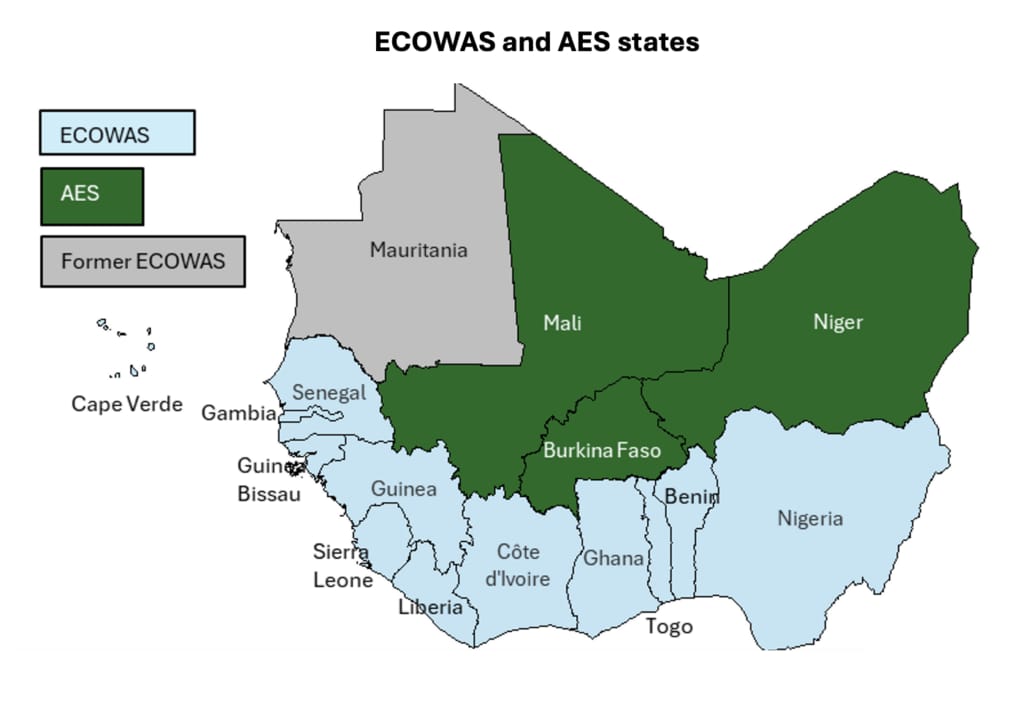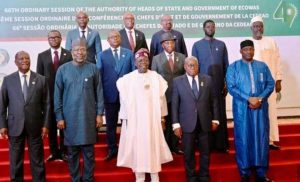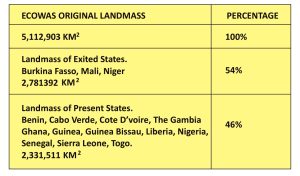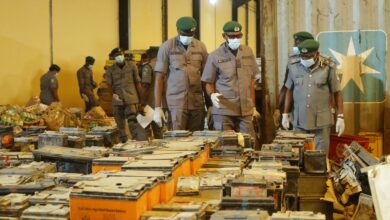
As ECOWAS celebrates 50 years of its creation, Ismail Aniemu reports that over half of the bloc’s land mass amounting to 54 percent space has been lost to the breakaway countries creating fresh challenges for regional cohesion and trade within the subregion
 The recent celebration of fifty years anniversary of the Economic Community of West African States (ECOWAS) is happening at a time the body is less than half of it’s original land mass reduced from 5,112,903 square kilometers to 2,331,511 km² with 2,781,392 square kilometers lost to the withdrawal of Niger, Mali and Burkina Faso
The recent celebration of fifty years anniversary of the Economic Community of West African States (ECOWAS) is happening at a time the body is less than half of it’s original land mass reduced from 5,112,903 square kilometers to 2,331,511 km² with 2,781,392 square kilometers lost to the withdrawal of Niger, Mali and Burkina Faso
Founded in Lagos on May 28,1975 ECOWAS was originally formed to provide regional economic cooperation among member countries but has developed to include political and military cooperation, as well.
 The group has played critical roles in peace and conflict resolutions in war ravaged member countries like Liberia, Sierra Leone and has strengthened integration through free movement of persons and goods including it’s ECOWAS Trade Liberalisation Scheme (ETLS)
The group has played critical roles in peace and conflict resolutions in war ravaged member countries like Liberia, Sierra Leone and has strengthened integration through free movement of persons and goods including it’s ECOWAS Trade Liberalisation Scheme (ETLS)
AES Breakaway Larger Than Original ECOWAS Body
Following military incursions in the politics of Niger, Mali and Burkina Faso, ECOWAS has become less than half of it’s original size leaving the body majorly fractured in terms of land mass despite having 12 countries intact .
Under the aegis of the Alliance of Sahel States (AES) , the three countries formed the alliance in September 2023, and they subsequently withdrew from the Economic Community of West African States (ECOWAS) in January 2025.
The three breakaway countries have started move to chart a new economic future outside the bloc. The AES is also working towards greater regional integration, as evidenced by their launch of a joint passport and military cooperation initiatives.
The total ECOWAS land mass was 5,112,903 square kilometers covering the original 15 countries. With the withdrawal of membership of the three countries that have approximately 2,781,392 square kilometers (km²) broken down thus -Niger: 1,267,000 km²;Mali: 1,240,192 km and Burkina Faso: 274,200 km² , ECOWAS is now left with 2,331,511 km²
Economic Implications
Whereas,ECOWAS was originally formed for economic integration and emancipation , the present realities have eroded this interest. The AES countries have shown more determination to cut ties with France and chart a new economic course with a new passport while seeking to establish relationships with new partners
This has become a hard knock on the ECOWAS Trade Liberalisation Scheme (ETLS) and is making the AES countries to seek maritime access through the port of Morocco in replacement to the proximate Nigeria, Benin and Togo ports being used before now.
Countries like Togo is considering to join the AES which originated as a mutual defense pact created on 16 September 2023 following the 2023 Nigerien crisis, in which the West African political bloc ECOWAS threatened to use military force to restore civilian rule after a coup in the sub region’s largest country by land mass,Niger
An international business man and maritime industry expert, Tony Nwabunike had opined that Nigeria should lead the journey to bring all the countries back
Nwabunike said “Nigeria should be seen bringing all countries in the bloc together. We can’t afford to lose our brothers because we found a rich friend in France
“I suspect the recent wrong accusations from Niger against Nigeria was merely on suspicion but in reality, the mindset could be that of “A friend to my enemy, is my enemy”I have said it before that Nigeria needs Niger Republic and other West African countries more than she needs France.
“Nigeria’s foreign policy should be tailored towards building an Africa that is political strong, economically self reliant and united in solving their common problems of poverty, hunger and insecurity.” he said
Goods transiting within the countries under ETLS may have to now move in a different regime unlike what obtained in the past as the AES countries now encourage their citizens and business owners to prioritise the use of their newly launched passport
While ECOWAS has given these three AES states a six-month transition period until July 2025 in case they backtrack and want to return, the AES leaders have rejected that scenario, asserting that their decision is irreversible. Their exit from Africa’s largest political and economic union threatens to disrupt flows of goods, services, and people—with potentially serious consequences for food security in a region where almost 17 million children under five are already acutely malnourished.











